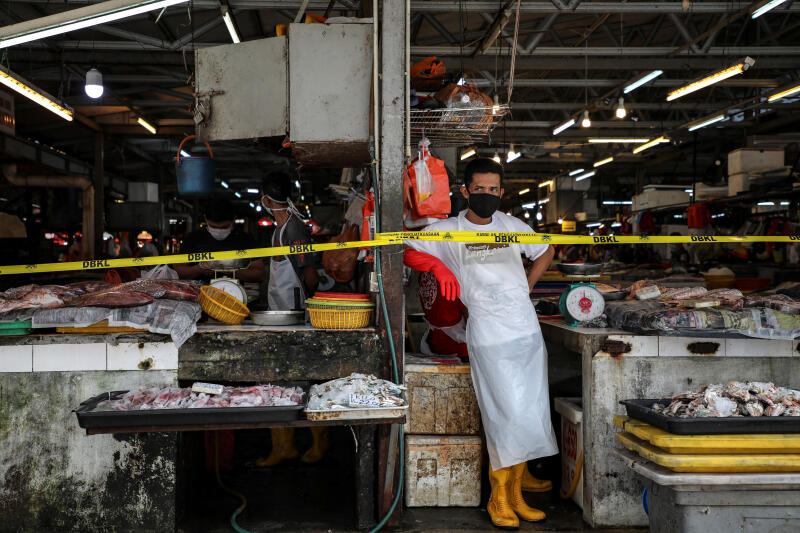Coronavirus: Farmers dump their stock after police impose restrictions at wholesale market
Sign up now: Get ST's newsletters delivered to your inbox

A vendor wearing a protective mask waits for customers at a market in Kuala Lumpur, Malaysia, on March 27, 2020.
PHOTO: REUTERS
Trinna Leong, Hazlin Hassan
Follow topic:
KUALA LUMPUR - At a time when shoppers in Malaysia are complaining of bare shelves amid the Covid-19 pandemic, fishermen and vegetable farmers have had to dump their produce because they have not been able get it to their customers, which include restaurants and supermarkets.
The city's main wholesale market in Selayang, Selangor, was last week ordered to cut the number of people working there and the hours it operates. The wholesale market has 440 stalls and employs over 2,000 workers.
It previously operated all day, seven days a week, but is now being allowed to run from 10am to 7pm and then from midnight to 7am.
The police, saying there were too many people there even without customers, have set up road blocks near the wholesale market from March 19, as part of Malaysia's Movement Control Orders (MCO), to control the movement of workers and customers there.
Farmers have been dumping their stock, blaming the roadblocks, shorter operating hours and lack of manpower to offload the trucks. About half the vegetable stalls in the wholesale market have also closed, said the Kuala Lumpur Vegetable Wholesalers' Association.
Several companies have since decided to work directly with farmers.
Online shopping website Lazada has created a new online sales and delivery service to help farmers from Cameron Highlands sell their vegetables to customers. It starts from March 30.
"We read about the Cameron farmers who had to throw away their fresh produce due to supply chain issues during MCO," Lazada said in a statement on Sunday (March 29).
"The Lazada team reached out, figured out the tech and the logistics, and got them onto the Lazada platform in lightning speed," it said.
Meanwhile, the Lazada platform is also being used by some fishermen to sell seafood.
These fishermen, who supplied restaurants, had been facing problems selling their stock as most restaurants are closed for business during the MCO.
Ms Audrey Goo, founder of the online seafood delivery service MyFishman which serves households, told The Straits Times: "Most of the products go to restaurants but they are not able to take in the seafood now.
"We take whatever we can accept from the fishermen and partner with Lazada to push it out to the market. It has been super crazy. Our orders have spiked by four or five times the usual amount."
Logistics provider Infinity Logistics and Transport said in a Facebook post on March 28 that it decided to buy 10 loads of vegetables, each containing up to 500 5kg cartons, for 10 days. These will be distributed to frontliners and the needy.
"We hope this small gesture can help out the farmers to lessen their burden and at the same time to ensure that the supply chain of food doesn't breakdown," the firm said.
Mr Fung Chee Siang, an organic vegetable farmer in Cameron Highlands who supplies to hotels, restaurants in Singapore and organic shops in Malaysia, said that orders from Singapore have dropped drastically but local orders are up.
"One reason is that more people are health conscious and in some areas, where fresh goods have been scarce, the demand has gone up," he added.
Some of the buyers are doing home delivery to customers.
"In fact, if we have more vegetables we can sell more, since overall demand has increased," he said.
Meanwhile, business is thriving in the grocery industry, including for those that offer home delivery services.
Supermarket chain Tesco urgently requires more manpower to quickly restock empty shelves and handle online orders.
"Our stores have been busier than normal, since the Movement Control Order was imposed on March 18," Tesco Malaysia chief executive Paul Ritchie told ST.
The supermarket chain is hiring over 100 workers nationwide in order to "enable our existing colleagues to rest and achieve better work-life balance during these challenging times".
Many Tesco customers had complained online of delayed or cancelled orders, with delivery slots all taken up until April 19.
Delivery service companies such as HappyFresh and Mygroser said they have no slots available until further notice.
Grab Malaysia said it has shifted tens of thousands of its drivers to become riders as restaurants, offering takeaways, and merchants have been inundated with orders.
"With the MCO, there is an obvious decline for transport, whilst a demand for deliveries. Therefore, we have onboarded tens of thousands of drivers as delivery-partners to help sustain their income while helping restaurants and merchants sustain their businesses too," said a Grab spokesman.
Grab launched a new service called Pasar on March 23, which delivers produce from local markets to Malaysian households, so shoppers do not need to join long queues at markets.
Disruptions in the supply chain have not only hindered the shipment of fresh goods, but also essential medical items such as gloves.
Malaysian rubber glove manufacturer Top Glove told The Straits Times that demand has doubled due to Covid-19 with orders globally. Although gloves have been listed as essential goods, the company has faced issues with its suppliers categorised as non-essential, making it difficult to get materials such as packaging.
It is also experiencing worker shortages due to the movement restrictions imposed during this period and is exploring ways to get workers who live near the factory.

